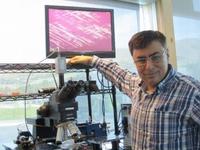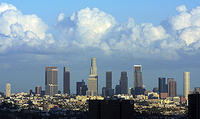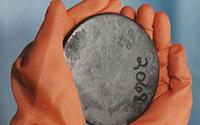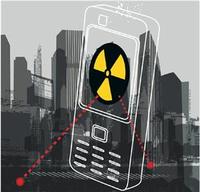-
A third Bell 412 helicopter delivered to NYPD for counterterrorism missions
The NYPD dedicated many hours to designing the specifications of the department’s third Bell 412 to meet the diverse needs of the police department; one of the counterterrorism additions to the Bell 412 is a radiation detection system that can identify radiation signatures from an altitude of 200 feet in an effort to protect the city from nuclear bomb threats
-
-
Radiation-resistant circuits from mechanical parts

Engineers designed microscopic mechanical devices that withstand intense radiation and heat, so they can be used in circuits for robots and computers exposed to radiation in space, damaged nuclear power plants, or nuclear attack; the devices can also survive work in space
-
-
Cost of a dirty bomb attack in L.A. would reach $16 billion

A dirty bomb attack on downtown Los Angeles’ financial district could severely affect the region’s economy at a cost nearly $16 billion, fueled primarily by psychological effects which could persist for a decade
-
-
International collaborative effort to develop better radiation detection tool
In mid-February, the Flash Portal Project was launched with the aim of furthering the development and testing of a new technology to detect shielded nuclear materials
-
-
A nuke blast in D.C. would not destroy city: report
A study finds that a 10-kiloton bomb detonated in Washington, D.C. would destroy many buildings and kill many people, but it would not completely destroy the city; says one expert: “If you are thinking about (a city) being wiped off the face of the earth, that’s not what happens”
-
-
Nuclear summit focuses on terrorist nukes

The Seoul nuclear summit focused on the risk of nuclear terrorism; there are two risks: first, fissile materials, which terrorists may use to construct a dirty bomb, is kept at thousands of medical, research, and industrial facilities around the world – often without sufficient security; second, constructing a Hiroshima-type bomb is not as difficult as we may think
-
-
U.S., three European countries, commit to HEU reductions

Leaders of Belgium, France, the Netherlands, and the United States said they were taking steps to minimize the use of Highly Enriched Uranium (HEU) for civilian purposes, where technically and economically feasible, in order to advance the goal of nuclear security
-
-
New method for cleaning up nuclear waste
There are more than 436 nuclear power plants operating in thirty countries, and they create a lot of nuclear waste; one of the more toxic elements in that waste is radionuclide technetium (99Tc); approximately 305 metric tons of 99Tc were generated from nuclear reactors and weapons testing from 1943 through 2010
-
-
Radiation-laced Japanese seafood detected in South Korea

The effects of the Japanese nuclear crisis at the Fukushima Daichii atomic energy plant are continuing to ripple across the world
-
-
Breakthrough in next gen nuclear detectors

Researchers have long struggled to develop radiation detectors that can spot a nuclear device hidden away in a shielded case, but a recent breakthrough could change all that
-
-
Scientists develop a dirty bomb detection system
As part of a £3 million international project funded by the European Commission, scientists at the University of Liverpool are developing a mobile detection system for nuclear materials that could prevent the construction of atomic weapons and dirty bombs
-
-
Molecule may aid nuclear waste clean-up
Scientists have produced a previously unseen uranium molecule in a move that could improve clean-up of nuclear waste
-
-
Monitoring nukes with social media

Acting Undersecretary of State for Arms Control Rose Gottemoeller is actively trying to find a way to incorporate social media tools to prevent nuclear weapons proliferation and keep fissile materials out of the hands of terrorists; the department wants to have crowdsourcing tools developed that could help ordinary citizens monitor a government’s nuclear activity and whether it was adhering to its stated promises
-
-
Tighter regulation of industry’s disaster preparedness required
Before 11 March 2011, Japan was held up as a paragon for preparedness; they had a national readiness plan, regular disaster drills, and strong civic engagement; the Fukushima disaster exposed a disturbing reality: search and rescue efforts were delayed, shelters ill-equipped, and supply chains broken; worst of all, there was confusion about who was managing the nuclear accident — the power company TEPCO or the Japanese government; information, when forthcoming, was sometimes contradictory
-
-
U.K. worried about dirty bombs

U.K. deputy prime minister Nick Clegg warned that materials to make a dirty bomb are readily available – so much so, that police forces cannot hope to contain such a threat; “That is a stateless threat, impossible for any national police force, no matter how advanced, to contain,” he said
-
More headlines
The long view
Keeping the Lights on with Nuclear Waste: Radiochemistry Transforms Nuclear Waste into Strategic Materials
How UNLV radiochemistry is pioneering the future of energy in the Southwest by salvaging strategic materials from nuclear dumps –and making it safe.
Model Predicts Long-Term Effects of Nuclear Waste on Underground Disposal Systems
The simulations matched results from an underground lab experiment in Switzerland, suggesting modeling could be used to validate the safety of nuclear disposal sites.
